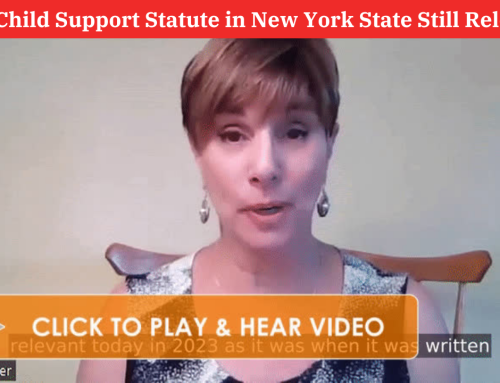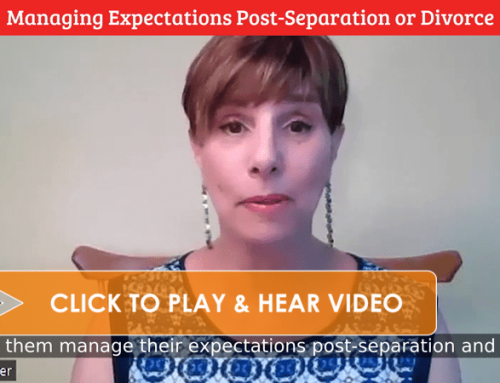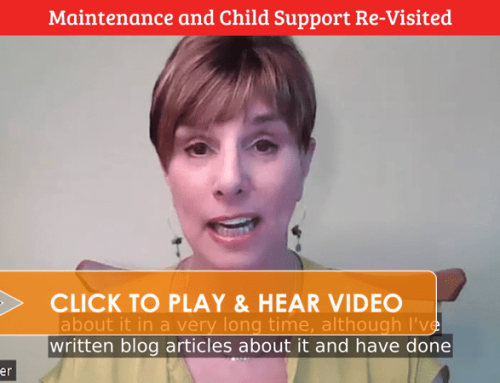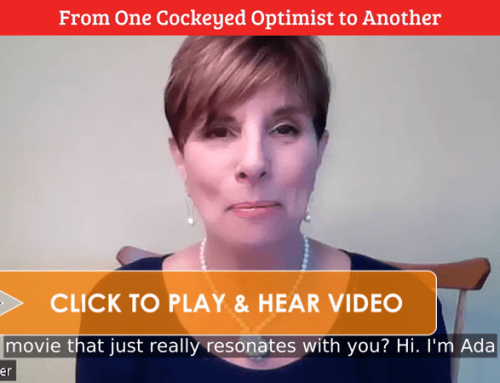 How many times have I heard the words: “Well, my lawyer said . . .” while mediating a challenging couple? When that ball gets lobbed over the net, it tends to indicate one or more of the following scenarios:
How many times have I heard the words: “Well, my lawyer said . . .” while mediating a challenging couple? When that ball gets lobbed over the net, it tends to indicate one or more of the following scenarios:
- That someone is not happy with the direction things are going thus far
- They have an unconscious wish for rescue
- Or they may merely be reciting their “legal entitlement” as a way of getting what they want.
I have a great deal of respect for many matrimonial attorneys. I can’t imagine how difficult it must be to advocate for someone who may have unrealistic expectations about the legal process and/or irrational notions about the outcome of a litigated divorce. When emotions are high and the fight or flight instincts are at unparalleled levels, trying to bring calm and reason to the storm is no easy task. It’s no wonder legal fees can be so high.
When a lawyer is consulted by a potential client, clearly they are hearing one side of the story. And the job of the attorney is to advocate for his or her client, advise them of their legal rights, and ultimately go for the “win” without the need of consideration for the “other” side’s needs or wishes. It’s a sort of zero sum game – one side wins, the other side loses. This is the main feature of the adversarial system, plain and simple.
The core and compelling difference between litigation and mediation is that as mediators, we go for the win for all the parties involved. And our clients are not just the couple sitting in our office but the invisible ones as well; the ones who can’t speak for themselves – the children. Mediation is a family focused process, plain and simple.
Sounds like a corny, marketing line, right? But it is the truth.
We, as mediators, are not advocating, nor representing either party in the mediation; therefore it’s perfectly acceptable and sometimes a good idea for the parties to consult with an attorney along the way. Mediators, even those who are attorneys, cannot and therefore do not, give our clients legal advice. What we provide is information so that our clients can make informed decisions for themselves.
So while I’m interested and often intrigued by what the lawyer “may have” said to the client, I am also on the lookout for the way the questions were posited to the attorney and therefore answered, whether or not all the information dispensed was received clearly and without interpretation, and if it was even possible to have the mediated perspective included. As the mediator working with both parties, my focus is manifold: consideration for the actual agreements being made by the parties as well as the context, tone, quality and efficacy within which they were made.
I imagine it would be difficult to advise a client without really understanding the framework by which ALL the agreements were made in the mediation. In light of this, if there is no context from which to draw their conclusions and advice, it would be unfair to assess the answers the attorney may have offered. The challenge is how to include the advice of the client’s attorney without undermining the mediation process.
As mediators, we strive for clarity, balance, and ultimately, practical results for our clients, both visible and invisible.
If you know anyone who would be interested in reading this blog, do not hesitate to forward it. Please feel free to use the Comments Box below to ask any questions, to comment, or to request more information.
- Does Child Support Have to be Paid? - April 17, 2024
- Is the Child Support Statute in New York State Still Relevant Today? (video) - April 2, 2024
- Managing Expectations Post-Separation or Divorce (video) - March 6, 2024






Nice piece, Ada. If my clients reach an impasse, I may ask them to come back to the next meeting with a brief note of their lawyer’s advice on the matter. I am not that surprised when the written advice is quite different to their previous representatin of it, and the difference between the couple is not as great, therefore, as they had previously thought.
As usual a very relevant article. Of course I relate everything back to credit counseling,and debt relief. Many times consumers will say, I need to run this by my Attorney or accountant. Once this happens, I can pretty much conclude that the client will be given advice by someone who does not have a clue about debt relief programs. Unfortunately, that usually includes Bankruptcy Attorneys. Most Attorneys simply have no training in any of the various debt relief programs that are available, and yes, that includes most Bankruptcy Attorneys. What debt relief approach is taken must be dependent on all the relevant circumstances of a consumers financial life. E.g. I have seen to many horror stories of Bankruptcies being filed when they should not have been. When my wife and I were going through our own financial crises, we turned to Attorneys for assistance. I can honestly tell you that the best advice we received was free and given to us by two retiring Attorneys who told us we might be better off educating ourselves and then fighting the battle ourselves, they even told us where to start, which is what we did, and it worked,